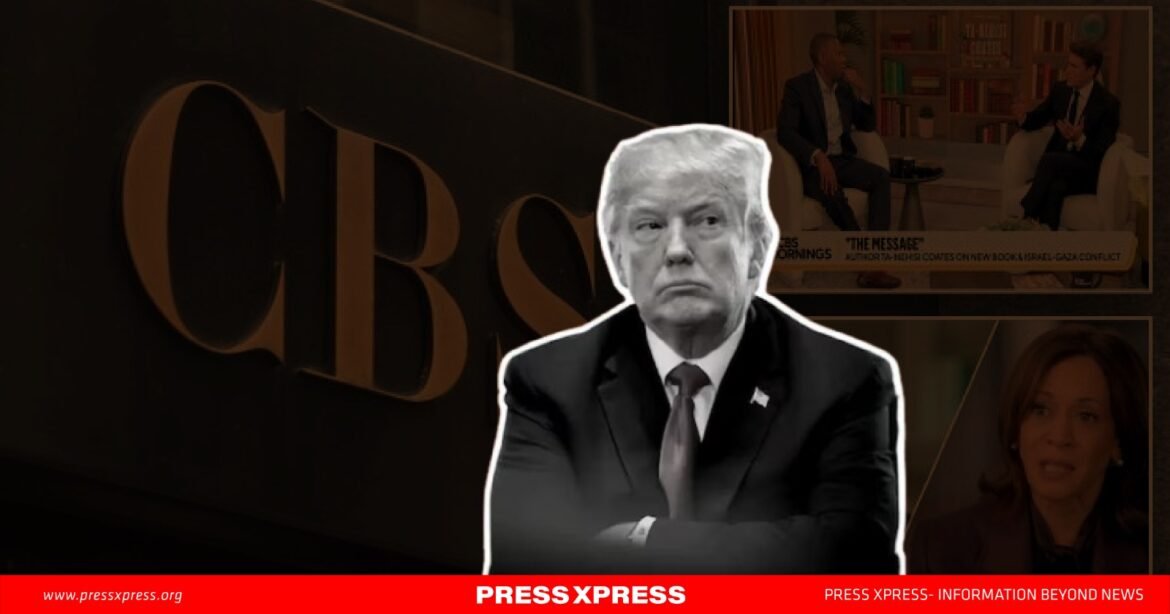Former President Trump is suing CBS News for $10 billion in damages, stating the network practiced “deceptive conduct” for the purpose of election interference in its interview with Vice President Kamala Harris. The lawsuit argues that CBS intentionally edited Harris’s response on Middle Eastern policy to present her in a more favorable light, thereby impacting Trump’s electoral chances. CBS, in defense, claims the editing was standard practice, intended to make the interview more viewer-friendly without misleading the audience.
This case, lodged in a Texas federal court with a Trump-appointed judge presiding, goes beyond routine media dispute. It touches upon ongoing debates over media impartiality, the ethics of selective editing, and the influence of news coverage on public opinion during election cycles. This article examines Trump’s allegations, CBS’s defense, and the potential impacts of this case on media trust and election integrity.
Trump’s Allegations
Trump’s lawsuit against CBS centers on claims of biased editing that allegedly reshaped Harris’s responses to make her appear more competent. According to Trump’s legal team, the network’s production altered the “essence” of her initial answers, transforming a lengthy response into a more refined, coherent statement that better served her candidacy. The campaign views this as a clear act of election interference, asserting that such editorial decisions crossed a line from routine editing into active political bias.
Trump’s team argues that this practice manipulates public perception, citing a Harvard CAPS/Harris poll where 85% of voters indicated a preference for full interview transparency. By selecting Texas as the legal venue, Trump’s legal advisors have positioned the case strategically, as the district court is known for decisions favorable to conservative stances, with Judge Matthew Kacsmaryk presiding. This case represents a broader battle between Trump’s camp and what they perceive as a liberal media landscape, with far-reaching implications for journalistic practices and electoral processes.
CBS’s Defense
CBS’s response to Trump’s lawsuit maintains that the interview’s edits were standard practice, aligning with industry norms aimed at making content digestible within limited airtime. In a public statement, CBS described the adjustments as necessary to condense Harris’s responses and ensure that the program could cover a range of topics within a 21-minute segment. According to Gayle Sproul, CBS’s senior vice president for legal affairs, the network’s intent was not to mislead but to enhance clarity.
The network’s stance rests on the defense that editorial discretion is within their rights, provided it does not fundamentally alter the conveyed meaning. The network is prepared to “vigorously defend” itself in court, suggesting that it sees this case as a defense of journalistic freedom against what it views as a baseless claim. For CBS, the outcome could set a precedent regarding the boundaries of editorial editing, potentially affecting how media outlets handle interview content with political figures.
The Public’s Role
Public sentiment around this case reflects a growing distrust in media impartiality, especially regarding politically charged interviews. As a key finding, the Harvard CAPS/Harris poll showed that a large majority of Americans—across political affiliations—believe the full, unedited version of the interview should be released, underscoring an increased demand for transparency in media practices. This trend points to a general public frustration with selective editing, which can lead viewers to question the authenticity of the content presented.
Media bias concerns are further highlighted by criticisms that news outlets selectively support certain candidates, a view that has gained traction among Trump’s supporters. This case taps into these tensions, with potential consequences for media outlets: a push for more transparency, less selective editing, and perhaps a shift toward publishing full transcripts or uncut interviews. The case outcome could redefine journalistic standards, particularly for high-stakes political interviews.
Strategic Implications
Trump’s legal team has strategically filed the case in Texas, a jurisdiction known for conservative leanings, particularly under Judge Kacsmaryk, whom Trump appointed. This choice aligns with Trump’s broader strategy of using the courts to combat what he views as media bias. By positioning the case in a favorable legal environment, Trump is signaling a commitment to challenging what he sees as an imbalance in media representation that disadvantages his campaign.
This tactic, often referred to as “lawfare” by his critics, reveals Trump’s intention to challenge not only CBS but potentially set a precedent that discourages media outlets from employing selective editing in politically charged interviews. If successful, this lawsuit could open the door for similar claims from candidates who feel they have been portrayed inaccurately, forcing media organizations to reconsider their editing practices.
The lawsuit between Trump and CBS encapsulates broader tensions between political figures and media outlets, raising fundamental questions about journalistic ethics and the role of media in election influence. Trump’s allegations of media bias reflect a growing scrutiny of selective editing, while CBS’s defense underscores its commitment to professional editorial standards. As the case progresses, its outcome could shape how news is presented, particularly in politically sensitive contexts, marking a pivotal moment in the relationship between media freedom and public trust.


